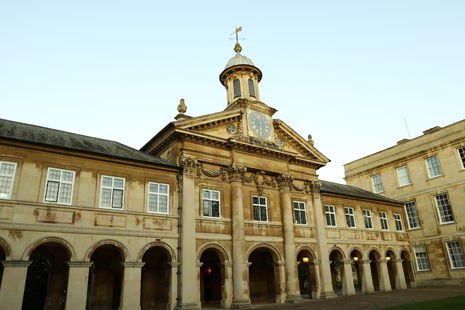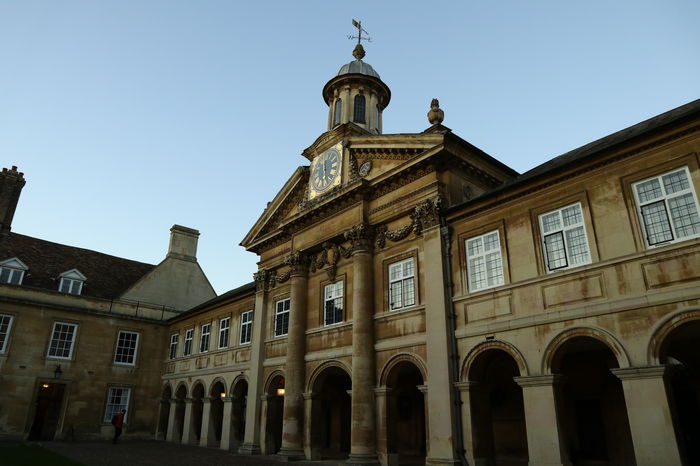Revealed: Emmanuel relies most on postgrad supervisors
An average of 21.2% of supervisions at Cambridge in 2023-24 were conducted by graduate students

Emmanuel College students are the most likely at Cambridge to be supervised by postgraduate students, while Clare College students are the least likely, a Varsity investigation can reveal.
According to Freedom of Information requests, a mean average of 21.2% of supervisions across 25 undergraduate colleges in the 2023-24 academic year were conducted by graduate students rather than academic staff such as Fellows or lecturers.
At Emmanuel, 27.5% of supervisions were led by postgraduates – the highest proportion of any college. This was followed by Jesus (26.3%), Newnham (25.8%), Christ’s (25.6%), and Pembroke (25.3%).
At the other end of the spectrum, Clare reported just 13.7%, followed by Gonville and Caius (14.5%), Trinity Hall (16.0%), Girton (16.4%), and Fitzwilliam (17.8%).
This 13.8 percentage point disparity between Emmanuel and Clare raises questions about differences in colleges’ reliance on graduate labour and potential inconsistencies in teaching experiences.
Cambridge’s supervision system, a hallmark of its undergraduate teaching, is described by the University as a means for students to “form connections with world-leading specialists” and is said to be “respected around the world”.
A University spokesperson told Varsity: “Delivering supervisions at Cambridge is seen as an important part of career progression for postgraduates. Pay and conditions for supervisors have improved over the last two years following engagement with representatives from the Justice for College Supervisors Campaign. This includes a 15% increase in remuneration rates.”
Sumouli Bhattacharjee, Postgraduate President at the Students’ Union (SU), praised the role of graduate teaching but raised concerns about disparities across colleges: “Conducting supervision provides a great opportunity for postgraduate students to leverage their knowledge and experience and help undergraduate students to achieve academic excellence and objectives.
“However, this should always be planned with consideration for the workload of postgraduate studies and ensuring that good training is provided, which supervisors are paid for completing… If inconsistency in provision results in some postgraduates feeling pressured to supervise significantly more than peers at other colleges, that’s not a fair situation. Our position remains focused on welfare and fairness for all students,” Bhattacharjee added.
A joint spokesperson for the Cambridge UCU and the Justice for College Supervisors (J4CS) campaign welcomed Varsity’s findings as evidence of postgraduates’ centrality to the teaching system: “The data underlines the pivotal role that postgraduate researchers play in the Cambridge supervision system. They are experts in their own right and provide outstanding teaching to undergraduates across the University, often receiving very positive feedback,” they said.
However, they criticised the use of graduate labour without secure employment terms. “What is most concerning, is that most postgraduate researchers and many other early career researchers that are not College and University Teaching Officers (CTOs and UTOs) supervise without the dignity of a secure contract. This means that these supervisors are usually not entitled to basic statutory rights, such as sick pay, are are not guaranteed a known number of hours that would allow supervisors to plan both their income and workload across the year.
“As such, we should not be concerned about the employment of postgraduate researchers as supervisors, but instead we should be protecting those supervisors and celebrating their contribution to University teaching,” they continued.
In November, the J4CS campaign alleged that the University’s trademark supervision system is “nepotistic”. The campaign accused faculties of relying on “connections and favouritism” to allocate teaching hours.
A month earlier, the University rowed back on its Predictable Working Policy, which would have regularised staff contracts – a decision the Cambridge branch of the University and College Union called “unfortunate”. This came as the UCU reported in June that over two-thirds of researchers at Cambridge are employed on precarious fixed-term contracts, with 13% on contracts of 12 months or less.
Postgraduate-only colleges were excluded from the dataset. Murray Edwards did not respond to FOI requests in time. Jesus College’s data was more limited; the College noted: “While we have access to some data relating to the academic post of supervisors, it is not comprehensive and cannot be extrapolated to represent all external supervisions.” Emmanuel College was contacted for comment.
 News / Cambridge students accused of ‘gleeful’ racist hate crime4 December 2025
News / Cambridge students accused of ‘gleeful’ racist hate crime4 December 2025 News / Churchill announces June Event in place of May Ball3 December 2025
News / Churchill announces June Event in place of May Ball3 December 2025 News / Uni redundancy consultation ‘falls short of legal duties’, unions say6 December 2025
News / Uni redundancy consultation ‘falls short of legal duties’, unions say6 December 2025 News / Cambridge cosies up to Reform UK30 November 2025
News / Cambridge cosies up to Reform UK30 November 2025 Comment / Don’t get lost in the Bermuda Triangle of job hunting 24 November 2025
Comment / Don’t get lost in the Bermuda Triangle of job hunting 24 November 2025









